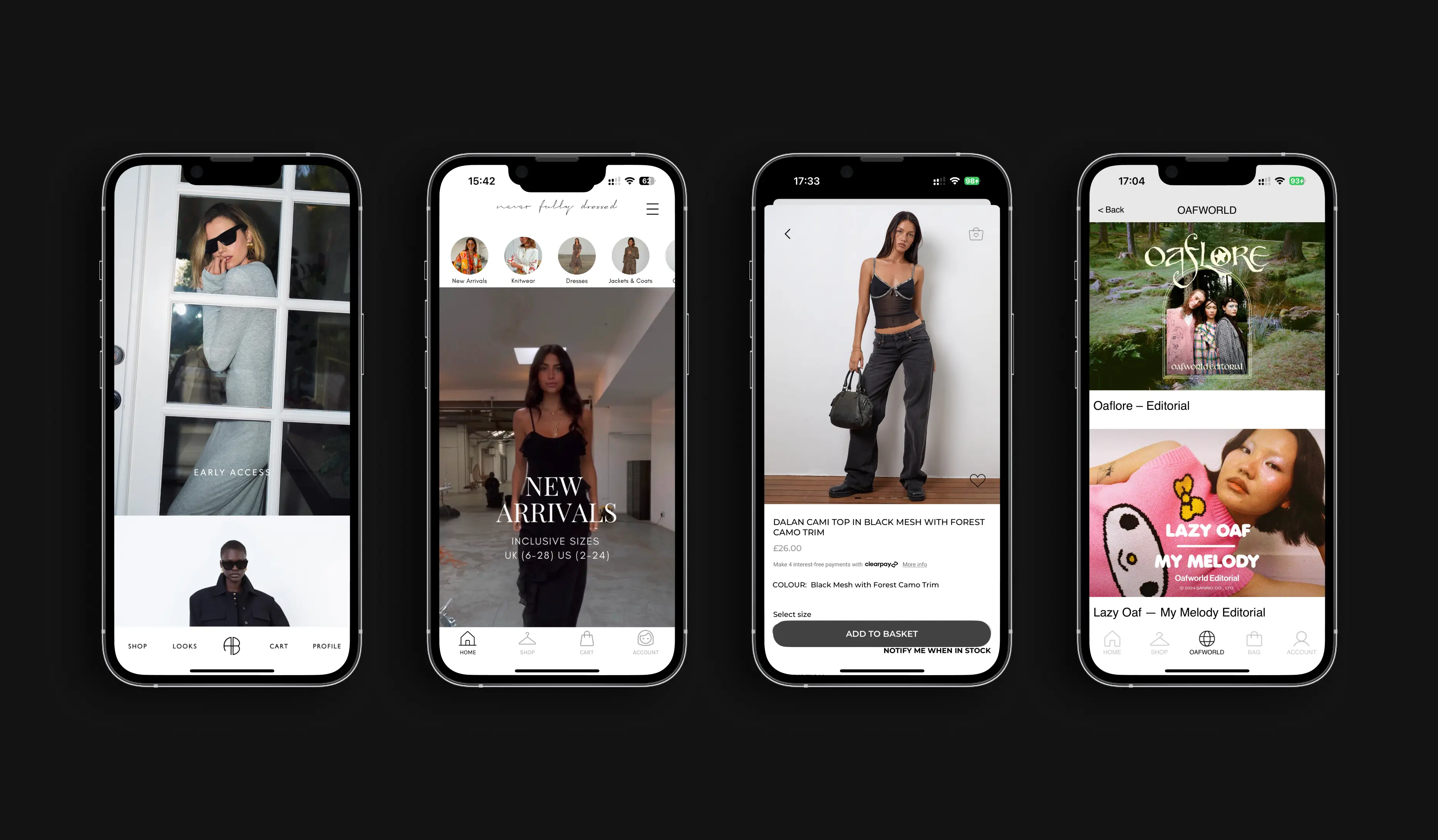How to turn your Shopify Store into a Native Mobile App (2025)
In today’s mobile-first world, having a Shopify store isn’t enough - customers expect a seamless shopping experience on their smartphones. While Shopify provides a mobile-friendly website, a dedicated mobile app can significantly enhance customer engagement, increase conversions, and boost lifetime value. This guide will walk you through the process of turning your Shopify store into a mobile app, breaking down the steps and exploring the available options for your business.
Author:
Josh Gare
Publish date:
17th March 2025
10 min read

Why turn your Shopify store into a mobile app?
Mobile commerce is growing at an unprecedented rate, making it essential for Shopify merchants to optimize for mobile-first shoppers. Over 50% of all eCommerce sales are expected to come from mobile devices in 2025.

The results of optimising for mobile first shopping speak for themselves. Here are just some of the benefits:
- Higher Basket Sizes & Conversions: On average, mobile app users spend 20% more per order (AOV) and convert 2x higher than mobile website users.
- Stronger Customer Loyalty: A mobile app can increase Customer Lifetime Value (CLTV) by up to 3x by keeping shoppers engaged and making repeat purchases easier.
- Better Mobile Shopping Experience: Apps offer faster load times, smoother navigation, and a seamless checkout, reducing friction and boosting sales.
- Retain Customers for Free – Unlike relying on expensive retargeting ads (Meta, Google) or costly email/SMS tools, you can send unlimited push notifications for free, driving repeat purchases without extra marketing spend. Read on here if you want to learn more about sending push notifications from your Shopify Mobile App.
Can You Create Mobile Apps with Shopify?
While Shopify does not directly allow you to create a mobile app for your online store, they do support third-parties that wish to build one.
Shopify provides a suite of libraries & APIs that enable developers to create native mobile shopping experiences. This includes creating custom storefronts, supporting login, account management, and fast checkout.

By leveraging Shopify’s GraphQL APIs & Mobile buy SDK, third-party app builders or an in-house team can turn your store into a native mobile app.
How to turn Shopify store into a mobile app?
If you are looking to turn your Shopify store into a mobile app, you have a few options:
- Use a Shopify mobile app builder, such as Venn Apps
- Use a custom mobile app development agency
- Build the app yourself in-house
Shopify mobile app builders are no-code solutions that seamlessly convert your online store into a mobile app. Many are available to download from the Shopify App Store, while others operate independently and offer a more bespoke, high-touch service.

Using a Shopify mobile app builder is the most popular approach. Here's how to turn your Shopify store into a mobile app, step by step:
Step One: Choose the best Shopify Mobile App Builder
There are several options available when choosing a Shopify mobile app builder. Some, such as Venn Apps, are designed to support larger brands with complex design and development requirements. Others, like Vajro or Plobal, are ideal for smaller businesses that want to launch an app quickly.
Be sure to choose the app builder that best aligns with your business size, needs, and goals. Read here for a full breakdown of the best Shopify mobile app builders in 2025.
Step Two: Design your App's frontend
Once you have selected a mobile app builder, you can begin designing your app's frontend. Some app builders provide a drag-and-drop tool that allows you to place blocks from pre-determined templates, similar to website builders like Shopify or WordPress. This approach allows you to design the app yourself, but only within the limits of the template.
For brands that require greater customisation, a bespoke builder like Venn Apps is more suitable. Venn Apps provides brands with a dedicated app designer who will collaborate with you to create a highly customisable design. This ensures your brand is accurately reflected in your app while also being optimised for app UX best practices.

Many scaling and established Shopify brands find that this tailored approach is more effective than a simple drag-and-drop solution. In the same way you might use an agency to build your Shopify website, it makes sense to trust an expert to assist with app design.
Step Three: Connect your Shopify backend to the App
Once you are satisfied with your app design, your Shopify store's data will be synced with your app and pulled through to the frontend in real-time. Your chosen mobile app builder will handle this automatically when you connect your store.
It's important to note that any third-party software you use to power your Shopify store will not be automatically synced. Ensure your chosen app builder is integrated with all the software you use to maintain continuity between your online store and app.
If you have multiple third-party tools supporting your store, Venn Apps is an ideal choice. Thanks to our proprietary middleware architecture, we can pull data from any third-party with an API. This middleware ensures all data loads quickly and is delivered seamlessly to users on the frontend.
Step Four: Your App is turned into working code
Once your app has been designed and synced with your Shopify backend, it is ready to be converted into working code and deployed to the Apple App Store and Google Play Store.
Shopify mobile app builders will handle this process automatically, so no technical expertise is required. However, it's important to note the programming language used. Many app builders opt for cross-platform frameworks like React Native or Flutter, which allow apps to be developed from a single codebase. While this is convenient for the builder, it's not always the best choice for your app. Using the native programming languages for Apple (Swift) and Android (Kotlin) will provide your customers with a smoother overall shopping experience.

At Venn Apps, all our apps are programmed in truly native programming languages, ensuring the smoothest mobile shopping experiences on the market.
Step Five: App testing and deployment
Once your app has been built, it must be tested and submitted for approval to the App Store and Play Store. Many app builders provide minimal support for testing, bug fixes, and submission, leaving you to manage this process alone.
If you are unfamiliar with app store submission, consider a solution like Venn Apps where this entire process is managed on your behalf. With our expertise in mobile app testing and deployment, we ensure your app is delivered seamlessly to the app stores and works flawlessly from launch.
Step Six: Launch and ongoing maintenance
Once your app is approved by Apple and Google, you are ready to launch.
You'll need an actionable strategy to promote your new app and encourage downloads. At Venn Apps, we provide comprehensive support for this, including dedicated download banners, launch assets, and app store optimisation tips.

Once customers begin shopping on your app, it's important to maintain it, fix bugs, and optimise flows wherever possible. If this sounds daunting, don't worry. Venn Apps will ensure your app is maintained to the highest standard with continuous support and fast bug fixes. This is just one of the perks of choosing a high-touch service instead of a basic app builder.
Alternatives to Shopify Mobile App Builders
Shopify mobile app builders are not the only way to turn your store into an app.
If you have a large budget (six figures or more), you could consider using a Shopify mobile app development agency or building the app in-house. Let's explore these approaches in more detail:
Shopify Mobile App Development Agency
These agencies are specialised mobile app developers that will build you a custom app and connect it with your Shopify backend. While this approach offers maximum customisation, it is prohibitively expensive. Custom agency app builds often cost well into the mid-six figures, and that is before factoring in retainer costs for ongoing maintenance.
Develop the App In-House
An alternative to hiring an agency or using an app builder is to develop the app in-house with a team of software engineers. This approach requires:
- Deep knowledge of Shopify’s APIs
- Building a custom frontend in a native programming language that matches your online store
- Integration of all third-party software that powers your online store
- Building a robust backend that can handle high traffic and order volume
While this approach provides the most control over your app, it is by far the most expensive and complex. Hiring developers, UX designers, QA engineers, and setting up your own servers can easily exceed the high six-figure range. If you are seriously considering building a mobile app in-house, check out our full breakdown of the pros and cons.
How to Integrate Shopify with an Android or iOS App?

Shopify will integrate with your mobile app via its APIs and SDK.
Shopify offers a series of GraphQL APIs, alongside a Mobile Buy SDK that your app will use to fetch products, update carts, handle checkouts, authenticate customer accounts, and more.
The Storefront API is the most relevant if you are looking to create a mobile app for your Shopify store. This API is designed to enable headless eCommerce, meaning you can decouple the backend and frontend of your store to build a custom UI.
Shopify mobile app builders will handle this integration seamlessly on your behalf. If you choose to develop the app yourself or use an agency, you will need an intimate understanding of the APIs.
How Much Does Shopify Mobile App Development Cost?
Depending on your chosen development method, costs can range from a few hundred dollars a month to tens of thousands.
- Basic Shopify mobile app builders start at around $300 per month for a templated app with minimal customisation. However, these entry-level builders often charge additional success fees, which can become very costly as your business scales.
- More premium app builders like Venn Apps start at $1,999 per month with zero success fees. For this higher price, brands can expect extensive customisation, a highly performant app, and a range of exclusive features designed to drive engagement and revenue growth.
- In-house builds and agency solutions require a large capital investment upfront, often exceeding $100,000, along with ongoing monthly maintenance fees that can run into five figures.
Benefits of Building A Shopify Mobile App
.webp)
Higher Mobile Conversion Rate
Native mobile apps provide a smoother shopping experience compared to mobile web views. Pages load up to seven times faster and navigation is much more intuitive and user-friendly.
As a result, customers view more products in a single session, making it easier for them to find something they love and check out.
Conversion rates on mobile apps tend to be two to three times higher than on websites.
Improved Customer Lifetime Value
Thanks to the ease of shopping on mobile apps, customers also spend more. Across Venn Apps' customers, the average order value is around 20% higher on their mobile app.
Venn Apps also offers a range of app-exclusive features that help drive repeat purchases and increase customer lifetime value.
For example, Represent sees its app customers spend around 65% more than online store shoppers in a given year. This is thanks to features like segmented push notifications, app-exclusive sales, and a bespoke 'Shop The Look' section.
A Direct Line to Your Best Customers
Mobile apps provide the perfect way to communicate directly with your best customers through push notifications. No reliance on social media, advertising, SMS, or email.
Push notifications are entirely free to send with Venn Apps, and can be segmented by user location, purchase history, loyalty tier, and more. Push notifications convert around seven times higher than email, making them a powerful revenue driver for your business.
.webp)
Beyond push notifications, apps are the perfect place to house exclusive brand content. Go beyond the transaction and provide your customers with custom blog content, styling tips, in-store appointments, and much more.
Luxury fashion brand TOTEME has an app that delivers all of these experiences directly to their loyal fans.

Cut Your Ad Spend
Why spend on paid ads to re-engage customers who have already bought from you? If they are on your app, all it takes is a free push notification to bring them back and encourage a purchase. With your own app, your costs on META, TikTok & Google will start to plummet dramatically.
A Place on Your Customers' Home Screen
Much like having a flagship store on a popular shopping street, having space on your customer's phone is valuable real estate. Your brand will only ever be a tap away for those loyal shoppers.
Why Venn Apps is the Best Shopify Mobile App Builder

Venn Apps is the best Shopify mobile app builder for design-conscious brands that want to turn their Shopify store into an app.
Venn Apps provides the flexibility and customisation of an agency or in-house developers, without the hefty price tag. If you have a strong brand identity and want to ensure it translates seamlessly into your mobile app, Venn Apps is the best app building solution on the market.
In addition to app building, Venn Apps offers a strategic app success service as part of the cost. With a suite of app-exclusive features and a dedicated app success strategy, Venn Apps will ensure your app delivers on your intended business goals.
We have helped many leading Shopify brands, including Represent, Anine Bing, TOTEME, and Motel Rocks, deliver exceptional mobile apps to their customers.
Get in touch today if you're considering a mobile app!
FAQs
How long does it take to launch a Shopify mobile app?
A fully tailored app can be ready in just a few weeks, depending on complexity.
Will the app be available on both iOS and Android?
Yes, Venn Apps develops native apps for both iOS and Android, ensuring a seamless user experience across platforms.
Can I integrate my existing Shopify apps?
Yes, Venn Apps will integrate all third-party plugins and software that your store uses.
related blogs
9 Strategies to Increase Customer Lifetime Value (CLV) in eCommerce
15 min read
author:
Josh Gare
publish date:
11th April 2025
Strategy Spotlight

Product Updates H1 '25: More Control, Better Insights, Greater Flexibility
10 min read
author:
Max Hatter
publish date:
24th July 2025
Product News
.png)
9 Strategies to Increase Customer Lifetime Value (CLV) in eCommerce
15 min read
author:
Josh Gare
publish date:
11th April 2025
Strategy Spotlight

Product Updates H1 '25: More Control, Better Insights, Greater Flexibility
10 min read
author:
Max Hatter
publish date:
24th July 2025
Product News
.png)
8 Best Shopify Mobile App Builders in 2025
10 min read
author:
Josh Gare
publish date:
7th February 2025
App Development
.png)
Push Notifications vs Email: Which Drives More Engagement?
10 min read
author:
Max Hatter
publish date:
20th June 2025
Digital Marketing

Shopify Mobile App Development Services: Best Options for 2025
10 min read
author:
Max Hatter
publish date:
5th June 2025
App Development

How To Build An eCommerce App: Complete Guide (2025)
15 Min Read
author:
Max Hatter
publish date:
30th May 2025
App Development

35 Essential Stats on Mobile Commerce in 2025
10 Min Read
author:
Max Hatter
publish date:
16th May 2025
Industry Insights

9 Best ECommerce Mobile App Builders (2025)
10 min read
author:
Max Hatter
publish date:
5th September 2025
App Development

How to Optimize Your Shopify Store for Mobile: The Ultimate Guide
10 min read
author:
Josh Gare
publish date:
16th April 2025
Industry Insights

Guide to Push Notifications for a Shopify Mobile App
5 min read
author:
Josh Gare
publish date:
28th March 2025
Digital Marketing

12 Best Shopify Apps for Clothing & Fashion Stores (2025)
10 Min Read
author:
Josh Gare
publish date:
19th March 2025
Industry Insights

How to turn your Shopify Store into a Native Mobile App (2025)
10 min read
author:
Josh Gare
publish date:
17th March 2025
App Development

9 Essential E-Commerce Growth Strategies for 2025
15 min read
author:
Josh Gare
publish date:
14th March 2025
Industry Insights

Should Shopify Brands Develop Mobile Apps In-House?
15 min read
author:
Josh Gare
publish date:
7th March 2025
App Development

8 Successful Shopify Brands with a Mobile App
10 min read
author:
Josh Gare
publish date:
28th February 2025
Industry Insights
.png)
The Ultimate Guide to Push Notifications for E-Commerce
10 min read
author:
Josh Gare
publish date:
14th February 2025
Digital Marketing
.png)
Shopify Summer Editions: 5 Things We’re Most Excited About
10 Min Read
author:
Max Hatter
publish date:
2nd June 2025
Industry Insights

The 5 Best Tapcart Alternatives To Build A Shopify Mobile App
10 min read
author:
Max Hatter
publish date:
1st July 2025
App Development
.webp)
10 tips to increase app downloads and user activity for Shopify merchants
5 min read
author:
Josh Gare
publish date:
18th November 2024
Digital Marketing

Delivering Omnichannel Loyalty with Mobile Wallet Passes
10 min read
author:
Max Hatter
publish date:
6th May 2025
Product News

WANT TO LEARN MORE ABOUT MOBILE APPS?


